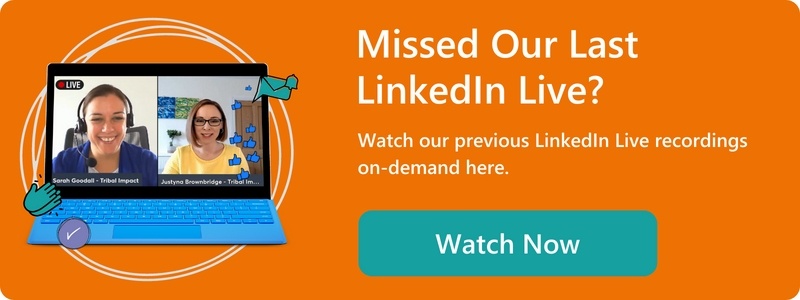Our weekly LinkedIn Lives series focuses on bringing together marketing, sales, and HR professionals to discuss their lessons in running employee activation programs on social media.
In one of our recent Lives, Vanessa Baker, Global Business Development Director at Tribal Impact, spoke to Dan Tyre, Sales Director at Hubspot, about whether employee advocacy can reduce the business impact of the great resignation.
You can watch the full interview here, or check out the summary of what they discussed below.
Employee Advocacy And The Great Resignation
More people are considering leaving their jobs now than ever. Many are even leaving their jobs without a plan.
According to a recent survey by PwC, which spoke to 52,000 workers in 44 countries, one in five employees are likely to switch jobs in the next year.
The pandemic made people realise their roles weren’t fulfilling, maybe they had little to no work/life balance, or they were burned out. Perhaps they concluded that life is too short to keep doing that for the rest of their lives.
When key talent becomes disengaged and/or leaves, this impacts business continuity and sales. Employee advocacy can help to reduce this in several ways:
1. It Helps Employees Develop Their Skills
Encouraging employees to share content on social media promotes their personal brand as well as the company’s. These days, people don’t trust the brand – they trust the people they’re following.
It’s important businesses understand that this is a benefit, not a threat. Employees can build their brand and help the company at the same time. This enables growth both for the individuals and their companies.
If employees are engaged and supported, employee advocacy can be a form of development, teaching them new skills that will help them professionally.
When relevant, educational content is curated into your advocacy platform, it will also help them grow their knowledge and their brand.
2. It Helps Attract New Candidates
Employee advocacy can play a massive role in attracting new talent.
The best time for recruiters to approach a candidate is 30 days after they’ve already started a different job. This is because they are told one thing about the company culture before accepting the job, then they start their new role and realise they were sold something else.
Advocacy means that candidates know what they’re signing up for from the start.
Employees are often transparent about where they work and how they feel about the organisation on social media. If they’re disengaged or demotivated, their peers will know.
3. It Helps Showcase Your Workplace Culture
‘Company culture and employee advocacy isn’t necessarily an outcome. It starts with building something that people are proud of,’ said Dan.
Engaged and motivated employees are happy to become advocates for the company they work for. They want to let it be known publicly that they work there, but that will only happen when they enjoy where they work and feel a sense of belonging.
4. It Embraces Diversity, Equity And Inclusion
Advocacy allows people to see someone for who they really are. This can mean that possible candidates are more likely to see themselves reflected in a role.
On social media, everyone can find a group of like-minded people. They may never get to meet in person, but there’s a global network of people for them.
5. It Amplifies The Messages
When an employee shares the same message via their own social channel, it gets 500% more engagement than if the brand shares the same message.
Companies with disengaged employees who don’t share on social media are missing a trick from a marketing ROI point of view.
‘In the old days, if you wanted to get your brand out, you had to have a television commercial, or you had to do radio,’ said Dan. There was a lot of pre-production – and expense – involved.
That’s not the case for social advocacy. It’s one of the most cost-effective ways to get to prospects and customers and new employees.
Conclusion
The impact of the great resignation is going to be felt by many companies. Employee advocacy programs, if managed well, can reduce this by having a positive impact on staff retention and recruitment, brand perception, sales, marketing, and more. They help employees develop their skills, enable the company to showcase its culture for the new candidates and amplify messages further. Moreover, it’s an extremely cost-effective way to organically reach new candidates.
Watch the full interview here.




